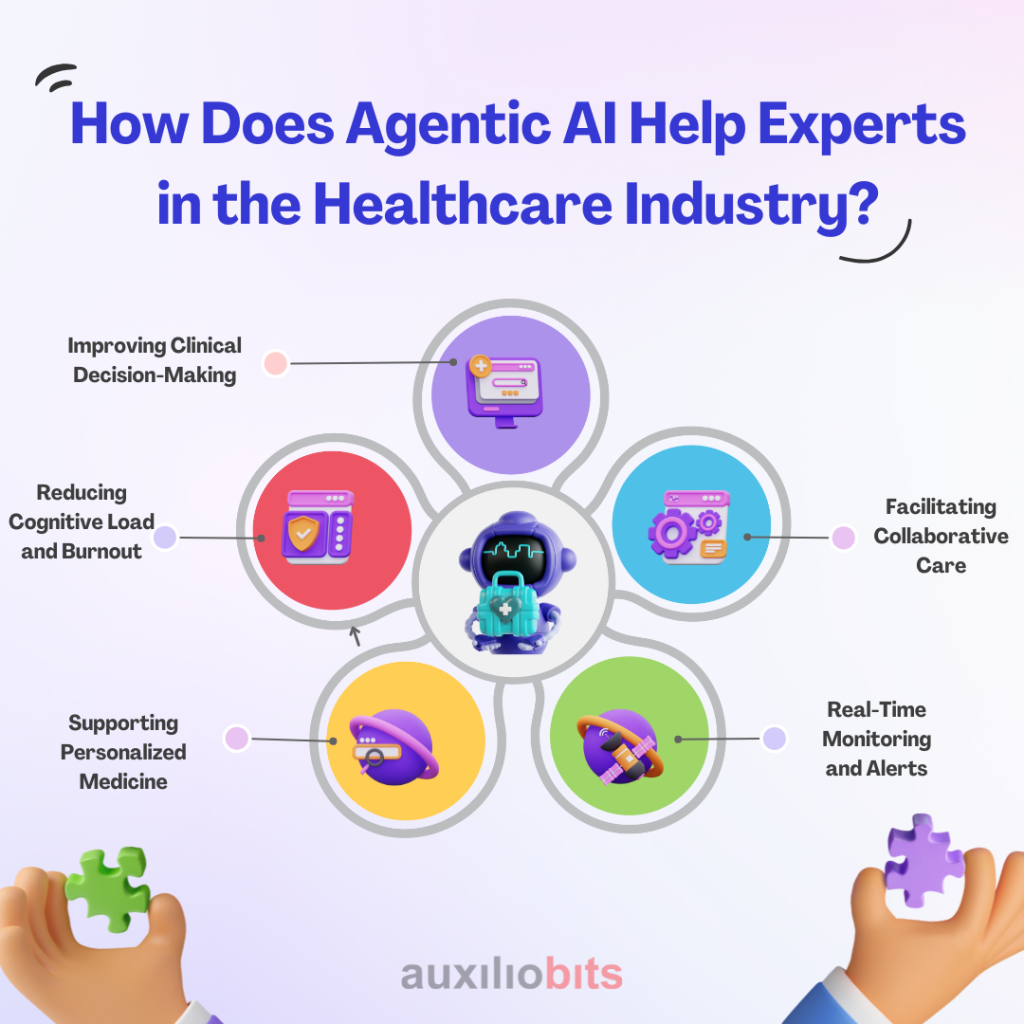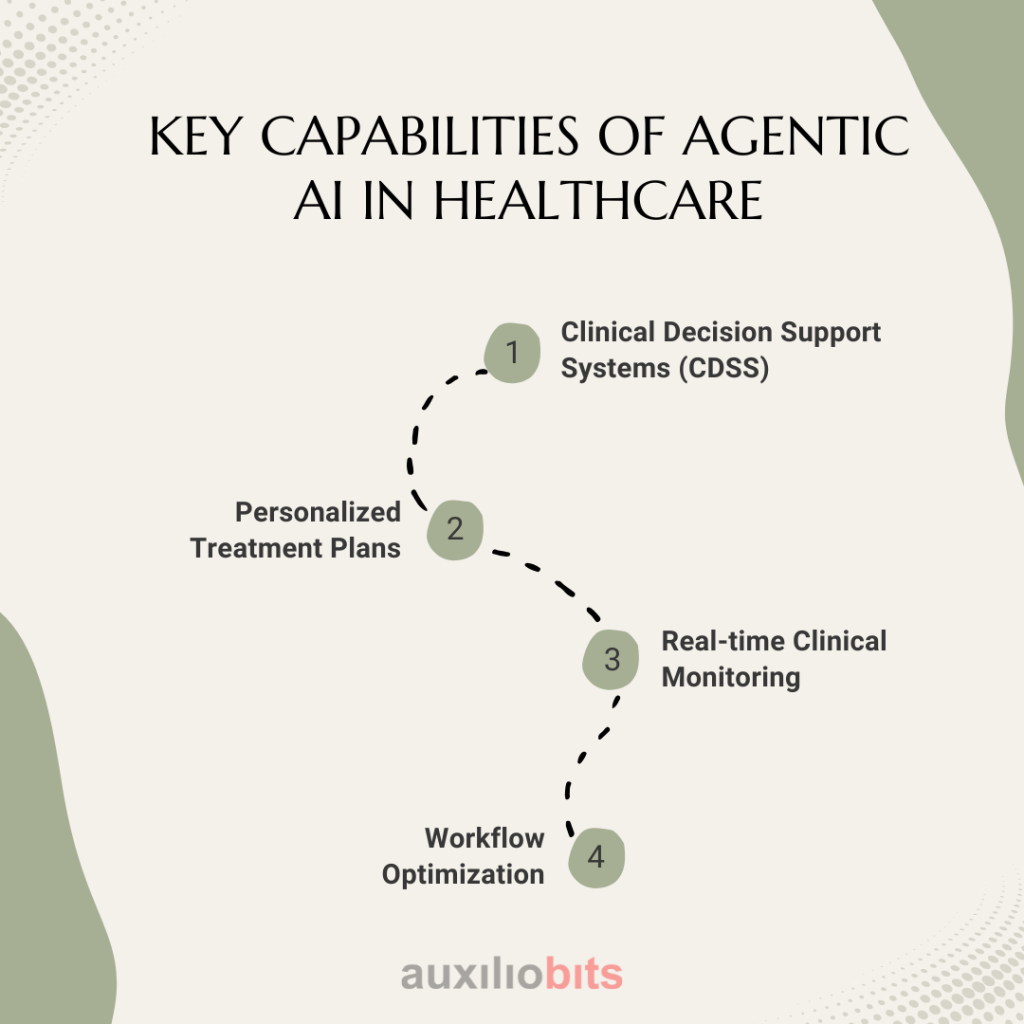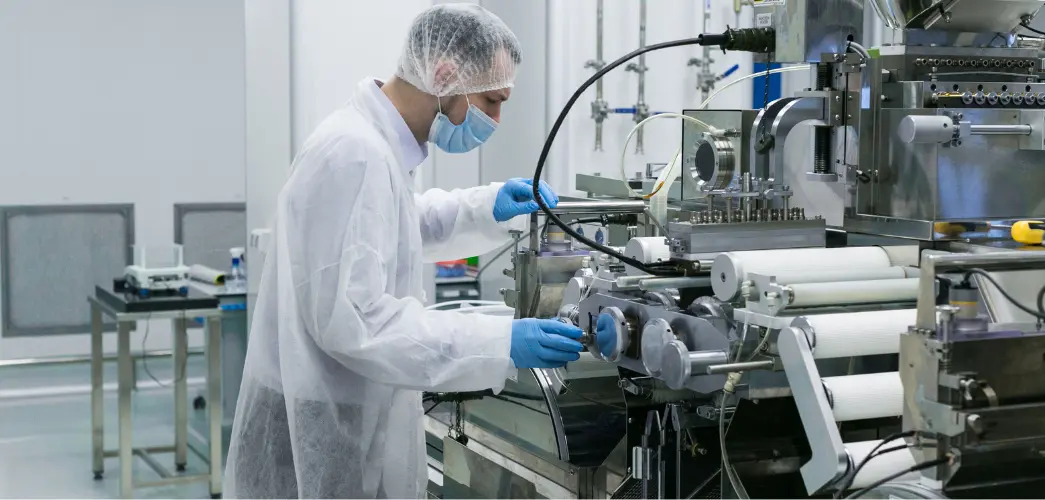
Key Takeaways
- Agentic AI enhances clinical decision-making with tailored, data-driven insights for better diagnostics and treatment accuracy.
- Real-time monitoring allows early intervention, improving patient safety and outcomes.
- Automation of administrative tasks reduces clinician burnout and improves efficiency.
- Personalized care plans are optimized through AI analysis of genomics, lifestyle, and treatment feedback.
- AI agents support multidisciplinary collaboration, ensuring seamless and timely care across departments.
The healthcare industry has faced numerous challenges over the past decades. The list is vast, from patients waiting in long queues to not getting appropriate solutions. However, after artificial intelligence was embedded across its ecosystem, the healthcare sector has experienced some great benefits. Earlier, it was all about performing administrative tasks and ignoring what patients needed. But with the introduction of agentic AI, the tables turned for good. Agentic AI is an autonomous system that functions independently, considering all the essential requirements of the patients.
Additionally, agentic AI is so much more than conversational interfaces. It has expanded into paramount domains, including personalized medicine, clinical decision support systems, and diagnostics. The AI agents are innovative and can analyze insights for physicians and monitor real-time patient data. For example, agentic AI can help professionals identify early diagnoses by recognising details the human eye may overlook. Also, it plays a vital role in developing tailored treatment plans that consider the patients’ medical history, genetics, and lifestyle. Let’s dig deep and understand how agentic AI has improved the healthcare sector.
Also read: Building Autonomous AI Agents for Manufacturing Control Systems
How Does Agentic AI Help Experts in the Healthcare Industry?
One primary reason agentic AI is given immense importance in the healthcare sector is its exceptional skills in promoting clinical excellence and ensuring seamless administrative tasks. That said, we have explained some of the benefits below:

1. Improving Clinical Decision-Making
Agentic AI significantly improves diagnostic accuracy and treatment planning by synthesizing vast data from electronic health records (EHRs), medical literature, imaging systems, and real-time patient data. For physicians, this means receiving context-aware recommendations, such as differential diagnoses, drug compatibility insights, and evidence-based treatment options, right at the point of care. The insights obtained differ from the basic ones. They are tailored to every patient, considering their medical history and risk factors, allowing doctors to make better decisions.
2. Reducing Cognitive Load and Burnout
Due to intricate administrative tasks, medical experts often face several issues when making decisions. From being available at the front desk to performing administrative tasks, the experts are usually busy, so they do not have sufficient time to handle the patients. Agentic AI resolves this challenge by automating everyday operations, including scheduling, report generation, coding, and documentation. Managing repetitive, non-clinical tasks allows professionals to prioritize important tasks, enhancing job satisfaction.
3. Supporting Personalized Medicine
Agentic AI allows experts to create personalized treatment and care plans. This is done by identifying genomic data, patient preferences like cardiology, oncology, etc, and lifestyle factors. AI agents keep learning from past patient data and ensure that the recommended treatment options are refined.
4. Real-Time Monitoring and Alerts
Agentic AI systems can monitor real-time data. Whether it is a bedside monitor, lab test results, or wearable devices, agentic AI systems never disappoint medical experts and ensure accurate results. Also, they ensure that the experts are aware of any complications beforehand. This allows them to prepare themselves for timely intervention.
5. Facilitating Collaborative Care
AI agents have the skills to collaborate with other systems and function in several care departments. This allows professionals to share patient information in the concerned department. Apart from this, the staff can equip themselves, make suitable strategies, and offer care plans, ensuring the patient gets treatment on time.
From Chatbots to Intelligent Agents
The introduction of chatbots in the medical sector marked a tremendous shift in how patients communicated with providers. AI-driven assistants were mainly utilized for managing regular activities, including responding to patients over the phone, answering their questions, scheduling appointments with the doctor, and performing basic examinations. They offered a user-friendly interface that helped professionals lessen the administrative burden and ensure patients got treatment without delay. Nevertheless, chatbots did not work wonders for the healthcare sector because they functioned within strictly defined guidelines and were helpful for basic tasks only. Therefore, the shift from chatbots to agentic AI was a must.
Agentic AI can gather all the essential information from past data and adapt to changing contexts in real time. These agents take immediate action and analyze, interpret, and perform. For example, they can find potential treatment pathways matching the patient’s medical history and recommend essential diagnostic tests. Moreover, they help doctors in other departments offer a seamless procedure.
Key Capabilities of Agentic AI in Healthcare
Agentic AI has left no stone unturned in enhancing how health treatments are delivered to patients. It offers immediate perks to them. Some of the benefits are mentioned below:

1. Clinical Decision Support Systems (CDSS)
Instead of using basic alert messages or reminders, agentic AI agents can now analyze structured and unstructured data from notes prepared by physicians. They can also gather data from electronic health records, imaging results, and lab reports, ensuring that all ethical practices are followed while conducting the procedure. Hence, agentic-AI-driven CDSS provides sophistication compared to traditional systems.
AI systems also consider a patient’s diagnosis and suggest an appropriate test. Furthermore, they indicate what medicines will work best for them. The best part about these agents is that they support physicians with evidence-based suggestions. Therefore, there is always transparency between the physician and the patient. This builds trust and offers reliability while avoiding treatment delay.
2. Personalized Treatment Plans
Agentic AI plays a crucial role in enabling precision medicine. These agents can develop highly personalized treatment regimens by analyzing genomic data, lifestyle factors, environmental exposures, and individual patient preferences. Based on molecular profiles and real-world outcome data, they can match patients to the most suitable therapies or drug protocols.
Importantly, these systems learn continuously, refining treatment recommendations based on feedback loops from clinical outcomes. This is especially impactful in oncology, cardiology, and chronic disease management, where tailored interventions can significantly improve outcomes and quality of life.
3. Real-time Clinical Monitoring
Agentic AI systems excel in real-time monitoring by integrating data from wearable devices, bedside monitors, and lab systems. They can detect early signs of patient deterioration, monitor vital signs for anomalies, and proactively alert care teams to intervene before a situation becomes critical. This capability transforms reactive care into proactive, predictive management, particularly beneficial in intensive care units (ICUs), elder care, and remote patient monitoring scenarios.
4. Workflow Optimization
Agentic AI is equally valuable behind the scenes. It can automate routine administrative tasks such as documentation, data entry, and report generation. These agents also help coordinate care pathways, manage referrals, and predict patient discharge readiness. Additionally, they optimize scheduling and resource allocation by understanding demand patterns and clinical priorities. As a result, hospitals and clinics can improve efficiency, reduce operational bottlenecks, and enable clinicians to spend more time on direct patient care.
Conclusion
Integrating Agentic AI in healthcare marks a new era where technology doesn’t just assist but intelligently collaborates with healthcare professionals to deliver better patient outcomes. By evolving beyond the limitations of traditional chatbots, Agentic AI now plays a crucial role in diagnostics, treatment personalization, and continuous patient monitoring. It acts as a real-time partner for clinicians, helping them interpret complex data, make faster and more accurate decisions, and optimize workflows.
The actual value of Agentic AI lies in its ability to synthesize information, adapt to evolving situations, and provide personalized recommendations that support both patients and providers. Whether streamlining administrative tasks or assisting in life-saving procedures, this intelligent system ensures that healthcare is proactive, connected, and efficient.
As we look forward, the healthcare ecosystem will increasingly rely on such technologies to bridge gaps in care, reduce burnout, and scale expertise across departments. Ultimately, Agentic AI is not just transforming how healthcare operates—it’s redefining the future of patient care








